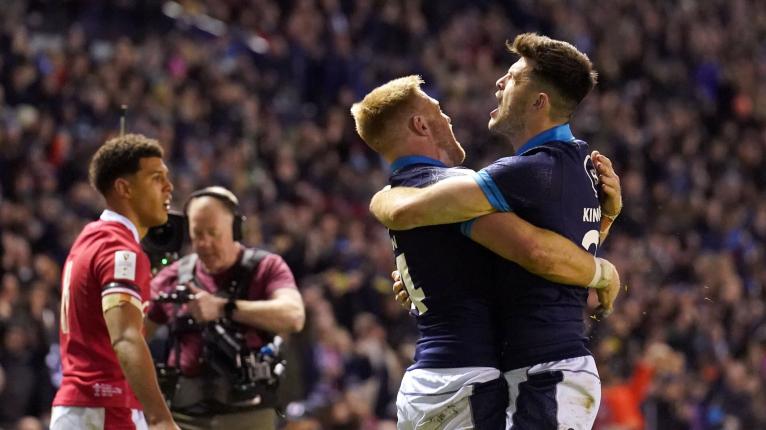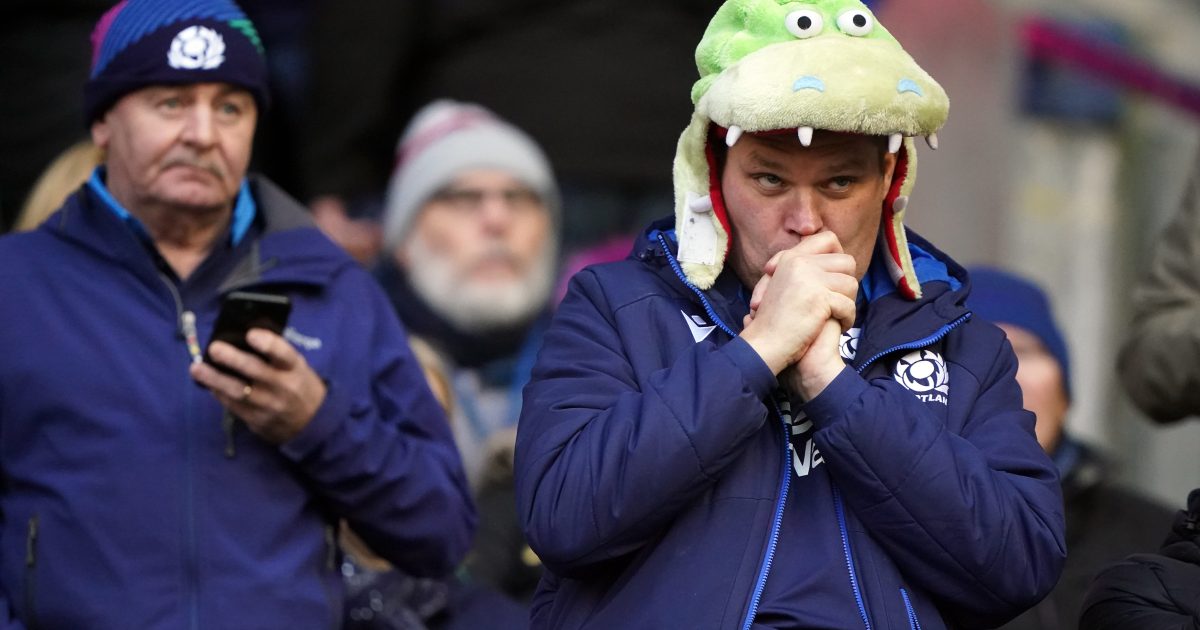Scottish rugby enters uncharted territory

Early in the second half, a wave of anxiety swept around Murrayfield. You could feel the nerves in the simmering atmosphere, the collective intakes of breath, the growing angst palpable all over the place.
From 13-0, Scotland were pegged back to 13-7. Rio Dyer had fumbled a glorious chance with the clock red to make it 13-12, possibly 13-14. Wales, rocked early on, had pivoted from the ropes and their shots were beginning to make Scotland wince.
These tortured Scottish souls inside Murrayfield had seen this movie a thousand times before. Pressure immense. Bogey opponent. Game in the balance. A statement win followed by a head-wrecking defeat. Same old, same old, right?
Except the scheduled showing of Groundhog Day was cancelled. If Scotland were in danger of subjecting their followers to that agonising picture, they soon ripped the film reel from the projector. Their performance in that closing half hour was superb, almost flawless in its execution. A mixture of steel in defence and wonder in attack. The upshot? A record victory over Wales, a 28-point margin amassed by some of the most sparkling rugby that will be witnessed this championship. A record-equalling points haul of 35. Five tries against their Six Nations rivals for the first time since 1982 when Roger Baird, Iain Paxon and Jim Calder were tearing up the old Arms Park. And perhaps most important – most psychologically significant – of all, Scotland’s first two-from-two start to a championship in the Six Nations era.
That’s the thing about this win. Rugby folk will revel in the tries and marvel at Finn Russell’s wizardry, but in blitzing Wales during those 30 second-half minutes, Scotland nuked all the talk and all the barbs about their resilience. For the longest time, their mentality has been doubted, their mettle queried. The suspect nature of a team that jolts from extreme to extreme pointed out time and again.
It was Dan Biggar this week, the great Wales fly-half using his pre-match press conference to lob some verbal grenades into the Scotland camp. He questioned their ability to back up one big result with another. He talked about the media’s infatuation with Scotland after another Calcutta Cup triumph when that solitary trophy is the only tangible thing they have to show for six years under Gregor Townsend.
This was put to Jamie Ritchie, the Scotland captain, afterwards. “Talk’s cheap, eh?” he responded. “We’ve not won anything yet, we’ve won two games, but we’re looking forward to performing well against France. They’ve got medals in the past but yeah, say what you want.”
Ritchie and Townsend played down the impact of Biggar’s words but they will have cut the Scottish rugby public deep. That’s because they weren’t without merit. These are questions that have been asked since Townsend first walked through the door at Murrayfield, since, in his earliest days in charge, Scotland won in Australia one week and were battered by Fiji the next. The erratic theme has gone on unabated. The past two Six Nations followed a familiar, maddening pattern and in those tense throes on Saturday evening, so many Scots feared history would repeat itself again.
In 2021, Scotland torpedoed a 38-year hoodoo at Twickenham then fell apart at home to Wales. In 2022, they did a number on England again, went down to the Principality and served up a lamentable non-performance.
Scotland’s unerring failure to string wins together, to find any sort of consistency or a bottom line beneath which they do not stoop has been a gnawing sore of the Townsend era. Biggar was right to weaponise it, even though the players themselves have indulged in none of the peacocking behaviour that seemed to irk him. The prospect of a wounded Wales toppling their team again would have brought most home supporters out in hives.
And then there was the Gatland factor. For a decade and more, the supercoach has stood astride this fixture, looming over Scotland like the Queensferry Crossing. Since 2007 his record read: played 11, won 11. The only Welsh defeats in that time came on the watch of his stand-in, Rob Howley, in 2017, and his successor-turned-predecessor, Wayne Pivac, in 2020. That record has fallen now, another ticked off by this Scottish crop.
Just when things were getting dicey, Scotland seized Wales by the throat and never loosened their grip. Russell, quiet in the first half, dazzled in the second. His sumptuous back-door offload gave Kyle Steyn a run-in. His beautifully measured crosskick put Steyn in for another. He dinked a shorter one for Duhan van der Merwe, slayer of England, to motor down the left and send Blair Kinghorn galloping home. Then he floated a neat parabola off the right hand to Matt Fagerson, who completed the rout. Russell stardust sprinkled on all four tries.
According to Opta, Russell has provided 10 assists in 9 Tests since the start of 2022. Nobody else from a Tier One nation has bettered the Racing man. Nobody in a Scotland jersey has ever set up three tries in a Six Nations game.
Lining up the touchline conversion after Steyn’s first, the maestro allowed himself a little glance up at the big screen replay, presumably to check just how filthy his offload looked in full HD. When Scotland sculpt this attacking shape, offer front-foot ball and load so many deadly options around Russell, there isn’t a fly-half in the world who can match him.
Inevitably most of the media chat in the aftermath was about Russell’s attack, less so the maturity that went with the magic. His clever, raking punts ushered the Welsh back-three down dark corridors. One whopper turned into a 50-22.
Townsend was at pains to talk up his pivot’s defence. Russell reads attacks like the world-class fly-half he is, but he hits much harder than his frame would suggest. Those who still lazily tag Russell as a ‘maverick’ or a ‘liability’ need to reconsider.
Just as at Twickenham, Scotland’s fabulous attack was built upon belligerent defence. Wales bludgeoned away for minutes at time; Scotland seldom looked flustered. Wales spent nearly seven minutes in the home 22 and scored one try. Granted, Dyer should have had another, but the ferocity and relentlessness of the Scottish rearguard action was hugely compelling.

All told, Scotland attempted 192 tackles and missed only nine. They conceded a single line-break. Huw Jones and Sione Tuipulotu, two of Scotland’s sharpest attacking weapons, made 24 tackles between them, missing one. Fagerson, a colossus of 27 tackles against England, contributed another 19. His big brother, Zander, marked his return from injury with 17. Richie Gray, excellent once more, managed 14. Serious numbers all-round.
There’s a contrast now between a Wales team finding its way and a Scotland team that has found theirs. Where Wales looked occasionally confused or bereft, Scotland had gears to move through and structure that suited them. They broke the Welsh defensive line 10 times. Their red-zone efficiency was sky-high again, four points per 22 visit this time. They conceded only 11 penalties to Wales’ 17. They have a firing attack, a snarling defence, a solid set-piece and a team that is producing some of its best moments late in games, when others tire. It’s a potent combination.
And they haven’t just built a team, they’ve built a squad. Kinghorn came on early for a concussed Stuart Hogg and shone in the wide expanses. Hamish Watson, Ali Price and Rory Sutherland have played no part, either on Saturday or at Twickenham. Each is a Test Lion. Darcy Graham, one of the form wingers in the game pre-injury, is out. So are Rory Darge and Adam Hastings. We have seen nothing of Sam Johnson or Stuart McInally or Ewan Ashman or Sam Skinner or Mark Bennett or Rory Hutchinson or plenty other enticing options.

The greatest tests are yet to come, of course. Paris is next, a smarting French team who saw their winning run dynamited in Dublin. Then Ireland, chasing a Slam, a side Townsend has never managed to outsmart, a team Scotland face in their World Cup pool and a team who have always found a brutal way to splinter Scottish momentum.
There’s more to come from Scotland too, though. That first half was nowhere near their best. They can be more ruthless still and more controlled in how they manage territory.
But these are heady times, the stuff of fantasy for a generation of Scots who have never seen their team challenge for anything. The demons of Twickenham are long-since banished. Now the spectre of Gatland and Wales has been vanquished. Two wins from two. Ten points from ten. And scope to get better. It’s an exhilarating thought. A nation of eternal pessimists are suddenly staring at half-full glasses.






































































